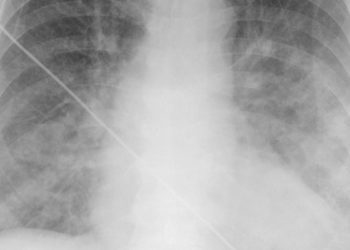Preoperative NT-proBNP concentration may help improve perioperative risk estimation
1. In this prospective cohort study involving patients who had inpatient noncardiac surgery, those with N-terminal pro-B-type natriuretic peptide (NT-proBNP) values of greater than 100 pg/mL were far more likely to suffer myocardial injury or vascular death compared to those with NT-proBNP values of less than 100 pg/mL.
2. Elevated preoperative NT-proBNP levels were also associated with increased 30-day all-cause mortality.
Evidence Rating Level: 2 (Good)
Study Rundown: Vascular complications are associated with perioperative death, yet the heavily-validated and widely-used Revised Cardiac Risk Index (RCRI) is somewhat lacking in predictive accuracy, often making it difficult to assess the appropriateness of surgery. One measurement that may improve model utility is concentration of N-terminal pro-B-type natriuretic peptide (NT-proBNP), a well-established biomarker of heart stress. This nested substudy of the VISION (Vascular Events in Noncardiac Surgery Patients Cohort Evaluation) trial aimed to determine the predictive value of preoperative NT-proBNP for the composite of vascular death and myocardial injury after noncardiac surgery (MINS), finding a significant independent association between the two variables. New prognostically relevant thresholds were identified, and coupling the metric with the RCRI was found to substantially improve discrimination as well as risk stratification. This study was highly powered thanks to a large, representative study population but was limited by its short follow-up. Overall, the enhanced risk estimation provided by the incorporation of NT-proBNP level may prove beneficial in guiding clinical decision-making for patients undergoing elective surgery.
Click here to read the study in Annals of Internal Medicine
Click here to read an accompanying editorial in Annals of Internal Medicine
Relevant Reading: Systematic Review: Prediction of Perioperative Cardiac Complications and Mortality by the Revised Cardiac Risk Index
In-Depth [prospective cohort]: This study drew from the population of the VISION study, recruiting 10,402 adults over the age of 45 who had inpatient noncardiac surgery with regional or general anesthesia between August 2007 and October 2013. Blood samples were drawn prior to surgery, and all study personnel were blinded to the NT-proBNP measurements. The reference group was defined as those with NT-proBNP concentrations <100 pg/mL. Compared to this reference, those with NT-proBNP measurements from 100-200 pg/mL had an adjusted hazard ratio (HR) of vascular death or MINS of 2.27 (95% CI, 1.90 to 2.70), 200-1500 pg/mL had an adjusted HR of 3.63 (CI, 3.13 to 4.21), and >1500 pg/mL had an adjusted HR of 5.82 (CI, 4.81 to 7.05). RCRI score was calculated using the following variables: history of ischemic heart disease, congestive heart failure, cerebrovascular disease, high-risk surgery, preoperative insulin use, and elevated preoperative creatinine level (>2 mg/dL). While the incidence of 30-day vascular death or MINS was associated with RCRI score, the inclusion of NT-proBNP thresholds substantially improved both discrimination (optimism-corrected c-statistic increase from 0.65 (CI, 0.64 to 0.67) to 0.73 (CI, 0.72 to 0.74)) and risk stratification (net absolute reclassification improvement, 25.8%).
Image: PD
©2019 2 Minute Medicine, Inc. All rights reserved. No works may be reproduced without expressed written consent from 2 Minute Medicine, Inc. Inquire about licensing here. No article should be construed as medical advice and is not intended as such by the authors or by 2 Minute Medicine, Inc.






